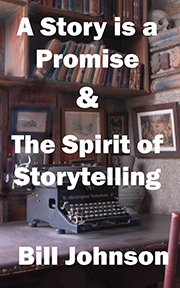| A Story is a Promise |
|
Script Services |
| Essays on the Craft of Writing |
|
|
| About the Author |
Posted 6/17/2001
The Exorcist -- Page Six Review
written by Bill Johnson
16, first sentence.
She wiped her hands on a paper towel and started moving toward the stove.
Willie moves to take care of the bacon. She's reacting to Chris's
presense. It's important that when a writer brings two characters
together, they react to each other. If they don't react to each
other, it shows that the author had no dramatic purpose in bringing
them together. If the author has no dramatic purpose in bringing
two characters together, the scene should be revised.
"I'll get it, Willie." Chris, ever sensitive, had seen her weary
look, and as Willie now grunted and turned back to the sink,
the actress poured coffee, then moved to breakfast. Sat down.
Blatty uses Chris's offer to help Willie to bring out another side
of Chris. Note that as a character Willie is clearly drawn to be a
contrast to Chris. It serves to heighten the effect of their being
together.
Continuing,
And (Chris) warmly smiled as she looked at her plate. A blush-red
rose. Regan. That angel. Many a morning when Chris was working,
Regan would quietly slip out of bed, come down to the kitchen and
place a flower, then grope her way crusty-eyed back to her sleep. Chris
shook her head; rueful; recalling: she had almost named her
Goneril. Sure. Right on. Get ready for the worst. Chris
chuckled at the memory.
Blatty uses this passage to add some detail about Regan. Again we
are being prepared so that when we meet Regan we will have an
emotional response to her, we will feel we "know" her. The name
"Goneril" comes from King Lear, by Shakespeare. Note the sly
humor in all this, in this house that will quickly be boiling over
as grandly as the action in King Lear. Also note the sly humor
that Goneril is a character in King Lear who undermines her
father and his household. This is another example of the author
setting up a character to have a thought or perform an action that
allows the story's audience to experience the role of the insider,
the one who knows how Chris's words will come back to, literally,
haunt her. Especially having Chris think of Regan as an "angel."
(Chris) Sipped at her coffee. As her gaze caught the rose
again, her expression turned briefly sad, large green eyes
grieving in a waif-like face. She'd recalled another flower.
A son. Jaime. He had died long ago at the age of three,
when Chris was very young and an unknown chorus girl on
Broadway. She had sworn she would never again give herself
as she had to Jaime; as she had to his father Howard MacNeil.
She glanced quickly at the rose, and as her dream of death
misted upward from the coffee, she quickly lit a cigarette.
Willie brought juice and Chris remembered the rats. "Where's
Karl?" she asked the servant.
The scene also returns to Chris's dream. She can't escape the nightmare.
Lastly, the scene ties back into the rats and Karl, who was established earlier in the story.
"I am here, Madam."
Since delaying Karl's appearance would serve no purpose, Blatty does not delay it.
Catting in lithe through a door off the pantry. Commanding. Deferential. Dynamic. Crouching. A fragment of Kleenex pressed tight to his chin where he'd nicked himself shaving. "Yes?" Thickly muscled, he breathed by the table. Glittering eyes. Hawk nose. Bald head.
With this introduction and description of Karl, Blatty again demonstrates his command of the words he chooses. "Catting in lithe." He uses the precise words he wants to describe Karl in a way that creates a strong impression of him.
Top of page
